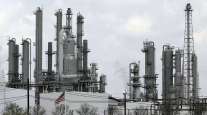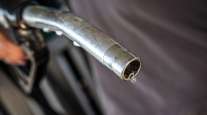Diesel Price Rises 6.3¢ to $4.089; Storm Spares Oil Facilities in Gulf
This story appears in the Sept. 3 print edition of Transport Topics.
The average cost of a gallon of retail diesel fuel in the United States rose 6.3 cents to $4.089 last week, the Department of Energy reported, but truckers received some positive news as Hurricane Isaac appeared to have spared oil and fuel facilities in the Gulf.
Diesel has now increased a total of 44.1 cents after eight straight weeks of gains, rising from $3.648 on July 2, DOE’s Energy Information Administration said in its Aug. 27 weekly survey of fueling stations. Prior to that, the national average had fallen every week for three months.
Diesel is now at its highest price since April 16, when it was $4.127 a gallon. Last week’s average price was 26.9 cents, or 7% higher than a year ago.
DOE also reported that the average price of a gallon of regular gasoline gained 3.2 cents to $3.776. In its own eight straight weeks of increases, gasoline had risen 41 cents since its July 2 average of $3.356, EIA figures show.
Gasoline is at its highest level since May 7, when it was $3.79. The most recent price was 14.9 cents higher than a year ago, a 4.1% gain.
Crude oil prices, which rose as most drilling in the Gulf of Mexico and fuel refinery activity on the Gulf Coast was halted ahead of Isaac, fell after the storm made landfall in Louisiana without the massive damage that prior storms such as Hurricane Katrina caused.
“It didn’t do any real damage to refineries or any of the actual production,” Sean Hill, a fuel analyst with EIA, told Transport Topics on Aug. 30.
Though the vast majority of oil drilling in the Gulf remained halted as TT went to press, it appeared that the oil and gas infrastructure in the region had not received any major damage, and it was anticipated work would soon resume.
“I imagine that people will get back to work in the Gulf now that the storm has passed and it seems the damage is minimal,” Bill Baruch, senior market strategist at Iitrader.com, told Bloomberg News.
Oil prices peaked on Aug. 28 at $96.33 a barrel on the New York Mercantile Exchange, but closed at $95.49 on Aug. 29 and $94.62 Aug. 30 as the storm passed.
Gasoline futures saw a similar trend, spiking right before the storm hit and falling back down afterward, Hill said. Diesel saw a smaller spike, but it was limited to the Gulf Coast region, EIA said.
Beyond that spike for both fuels, Hill did not expect any lasting price increases as a result of Isaac.
“It looks like supply balances of crude are fine right now, and it looks like it’ll stay level, at least,” he said.
Hill also said the Aug. 27 increase in diesel prices was due to recent steady increases in crude oil prices, combined with tight diesel supplies.
“Distillate stocks are still pretty tight, and some of the past few weeks’ run-up in crude prices is still trickling into diesel,” he said of last week’s gain.
The recent string of diesel price increases has been painful for H & W Trucking, Mount Airy, N.C.
“Ouch,” said Gary Harold, the carrier’s president. “We increase fuel surcharges every week. The problem is if it goes up too fast, we can’t recover it fast enough.”
H & W uses EIA’s weekly survey for its surcharges, but that can come a week after the company pays for fuel. Meanwhile, Harold’s company is receiving the surcharge from an old average.
“If it jumps 10 cents a gallon, and we buy 23,000 gallons a week, that adds up in a hurry,” he said.
In weeks of large increases, Harold keeps a close eye on fuel consumption by his 45-truck fleet. He encourages drivers to keep their speeds down and drive cautiously to save fuel, he said.
Beyond his company’s bottom line, Harold is concerned that fuel prices could threaten economy.
“When it gets high, it slows the economy down,” he said. Shippers pass the cost down to consumers, who could buy less, slowing down the economy. “When fuel gets so high, the economy’s going to stop.”
As the nation prepared for Isaac, the White House reiterated that a release from the Strategic Petroleum Reserve is still an option to try to keep fuel prices down but that President Obama had still not decided to do so.
“That option has been on the table for some time, and remains on the table, but we have no announcements to make today,” White House spokesman Jay Carney told reporters on Aug. 28.




